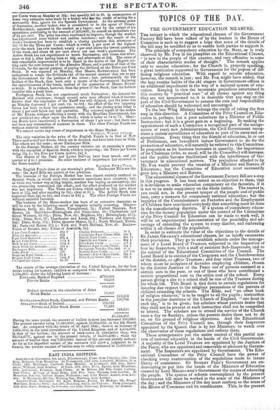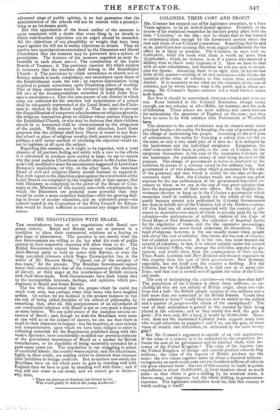TOPICS OF THE DAY.
THE GOVERNMENT EDUCATION MEASURE.
THE temper in which the educational clauses of the Government Factory Bill have been talked of by the leaders in the House of Commons is such as to suggest a hope that some of the details of the bill may be modified so as to enable both parties to support it. The principle of compulsory education by the State, as is truly observed by Mr. Fox in his pamphlet on the Educational Clauses, " is new to the people of this country, and very offensive to some of their characteristic modes of thought." The remark applies only to secular education ; for the Church is, properly speaking, of their characteristic modes of thought." The remark applies only to secular education ; for the Church is, properly speaking, a great institution supported by Government for the pupose of dif- fusing religious education. With regard to secular education, however, the remark is just ; and Mr. Fox might have added, that the lazy routine habits of the old stagers in Government-offices is an additional impediment in the way of a national system of edu- cation. Keeping in view the inveterate prejudices entertained in this country by " practical men " of all classes against any thing they are not accustomed to, it is desirable that any step on the part of the Civil Government to assume the care and responsibility of education should be welcomed and encouraged.
To the late Whig Ministry belongs the credit of taking the first step in this direction. A Committee of the Privy Council on Edw. cation is, perhaps, but a poor substitute for a 111inister of Public Instruction ; but it is a great gain as a beginning. By making the appointment of such a Committee a recognized part of the arange- ments of every new Administration, the Civil Government recog- nizes a certain surveillance of education as part of its cares and re- sponsibilities. Every thing that the friends of education, in or out of Parliament, can henceforth induce Government to do for the promotion of education, will naturally be referred to this Committee. In proportion as its business increases in quantity, the importance of its Chairman (who, as usual, will be the Committee) will increase, and the public become familiarized with the interference of Go- vernment in educational matters. The prejudices alluded to by Mr. Fox would prevent the creation of a Minister and Bureau of Education ; but the Committee of Education must necessarily grow into a Minister and Bureau.
The educational clauses of the Government Factory Bill are a step in this progress. It has been stated as an objection to them, that it is invidious to make education compulsory on the factories, if it is not to be made compulsory on the whole nation. The answer* you could not, in the present temper of the people and of public men, carry a measure for compulsory national education ; but the inquiries of the Commissioners on Factories and the Employment of Children have convinced everybody that something must be done in the manufacturing districts. If a system of compulsory educa- tion for the factory population under the control of the Committee of the Privy Council for Education can be made to work well, it will be an experimental demonstration of the possibility and ad- vantage of extending the system to every district, and embracing within it all classes of the population. In order to estimate the value of the objections to the details of Sir JAMES GRAHAM'S educational clauses, let us briefly enumerate their provisions. They go to establish schools under the manage- ment of a Local Board of Trustees, subjected to the inspection of four lay Inspectors, with a staff of assistant Sub-Inspectors, and to the control of the Educational Committee of the Council. The Local Board is to consist of the Clergymen and the Churchwardens of the district, ex officio Trustees ; and four other Trustees, two of whom must be occupiers of factories employing children, chosen by the district Justices of the Peace out of persons assessed at a certain sum to the poor, or out of those who have contributed a certain proportional sum to the entire cost of the school. Every person giving a site to a school shall be one of the Trustees during his whole life. This Board is tied down to certain regulations for insuring due respect to the religious persuasions of the parents of children attending the schools. The Bible, and "no other book of religion whatever," is to be taught to all the pupils ; instruction in the peculiar doctrines of the Church of England, "one hour in each day," is to be given ; but scholars whose parents desire that they shall not be present at such instruction shall not be compelled to attend. The scholars are to attend the service of the Church once a day on Sundays, unless the parents desire them not to do so, on the ground of religious objections. And the Educational Committee of the Privy Council are, through their Inspectors appointed by the Queen, that is by her Ministers, to watch over the observance of these regulations and enforce them.
These arrangements put the entire control of this partial sys- tem of national education in the hands of the Civil Government. A majority of the Local Trustees are appointed by the Justices of the Peace, who are appointed and removable at pleasure by Govern- ment. The Inspectors are appointed by Government. The Edw. cational Committee of the Privy Council have the power of checking every contravention of the regulations made to insure liberty of conscience. Sir ROBERT PEEL'S Government are en- deavouring to put into the hands of the Ministers of Education created by Lord MELBOURNE'S Government the means of educating the people. The system of schools contemplated by the present Government bill must be worked in the sense of the Ministers of the day ; and the Ministers of the day must conform to the sense of the House of Commons and its constituents. This, in the present
advanced stage of public opinion, is no bad guarantee that the administration of the schools will not be tainted with a proselyt- izing or an intolerant spirit. But this approbation of the broad outline of the measure is quite consistent with a desire that every thing in its details to which well-founded objections can be urged should be amended.
All the objections of any plausibility or weight that have been urged against the bill are in reality objections to details. They all resolve into apprehensions entertained by the Dissenters and liberal Churchmen that the measure may be perverted into a system of proselytism. The features of the measure regarded as most fa- vourable to such abuse are-1. The constitution of the Local Boards of Trustees : 2. The provision (section 55) which renders it necessary that the teachers shall belong to the Established Church : 3. The provisions by which attendance at church and at Sunday schools is made compulsory, and attendance upon those of the Establishment made the rule ; an express dispensation being required to permit attendance upon Dissenting places of worship. Two of these objections would be obviated by engrafting on the bill two of the recommendations embodied in Lord Joim Rus- SELL'S resolutions-1. That the rate-payers of any district in which rates are collected for the erection and maintenance of a school shall be adequately represented at the Local Board, and the Chair- man be elected by the Board itself: 2. That in order to prevent the disqualification of competent schoolmasters on religious grounds, the religious instruction given to children whose parents belong to the Established Church, or who may be desirous that their children should be so instructed shall be communicated by the clergyman of the parish. With respect to the third objection, Lord Jonsi proposes that the children shall have liberty to resort to any Sun- day school or place of religious worship their parents may approve : perhaps a still better method of obviating the objection would be, not to legislate at all upon the subject. Regarding this measure, as it ought to be regarded, with a total absence of all partisan feeling, and solely with a view to the effects it is calculated to produce upon society at large, we see no reason why the most zealous Churchman should object to Sir JAMES Giu- liani's bill, modified to meet the amendments suggested in LordJonit RUSSELL'S resolutions ; or why, on the other hand, the stanchest friend of civil and religious liberty should hesitate to support it. Nay, with regard to the objection urged against the constitution of the Local Boards contemplated by the original bill, it does appear, that with Ministers so completely in the power of the House of Com- mons as the Ministers of this country are—with constituencies in which the Dissenters are probably more powerful than they would be under a more extended franchise—with the growing feel- ing in favour of secular education, and an unfettered press—the control vested in the Committee of the Privy Council for Educa- tion would be found sufficient to counteract any danger from that source.



















































 Previous page
Previous page